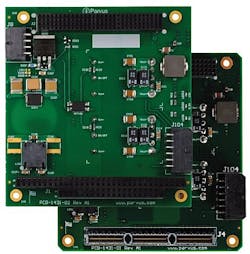Rugged embedded DC-DC power supply boards introduced by Parvus for military aircraft and ground vehicles
SALT LAKE CITY, 29 Aug. 2012.Parvus Corp. in Salt Lake City is introducing two rugged embedded DC-DC power supply boards with built-in MIL-STD power conditioning and electromagnetic interference (EMI) filtering for embedded computing applications in military ground vehicles and aircraft.
The rugged PC/104-Plus PWR-21-11 and PCI/104-Express PWR-22-11 galvanically isolated DC-DC converter modules provide 100 Watts of combined power output at 3.3, 5, and 12 volts.
The power electronics modules come equipped with MIL-STD-461 EMI filtering and transient protections for demanding 250-volt spike and 100-volt surge requirements under MIL-STD-1275.
The modules support an 18-to-36-volt DC input range for 24- and 28-volt DC applications and typically eliminate the need for additional in-line power conditioning/EMI filtering devices in military embedded systems, Parvus officials say.
The small-form-factor cards measure 3.55 by 3.775 inches, and are for PC/104, PC/104-Plus, PCI-104, PCI Express 104, or PCI/104-Express embedded system stack.
The modules operate without active cooling in temperatures from -40 to 85 degrees Celsius per MIL-STD-810G. They resist high levels of shock and vibration per MIL-STD-810G for fixed-wing jet aircraft, helicopters, and tracked ground vehicles.
The PWR-21-11 and PWR-22-11 power supplies are integrated into various Parvus MIL-STD-810/1275/704/461 qualified DuraCOR mission computers, DuraNET Ethernet switches, and DuraMAR mobile IP router subsystems.
For more information contact Parvus online at www.parvus.com.
Follow Military & Aerospace Electronics and Avionics Intelligence news updates on Twitter
